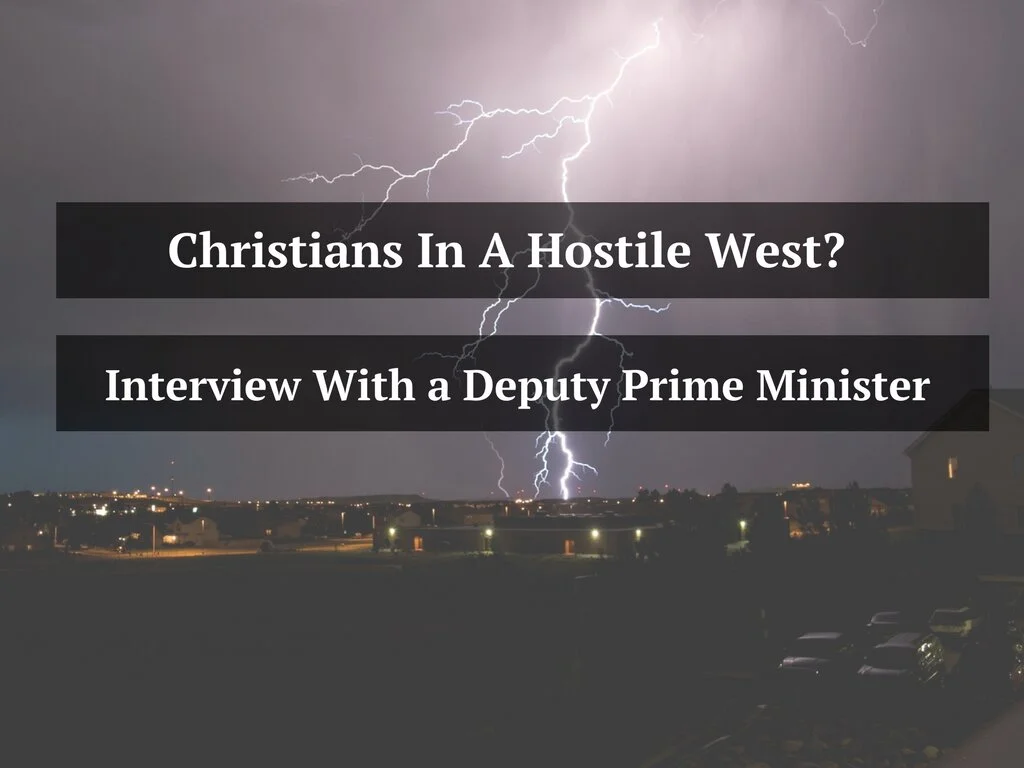Christians In A Hostile West? Interview With a Deputy Prime Minister - Part 3.
This is part 3 of a 3 part interview I did with John Anderson, a former Deputy Prime Minister of Australia.
John is also a devout Evangelical Christian, and I caught up with him last year to discuss the challenges facing Christians in a post-Christian West. (You can read part 1 here, and part 2 here).
Christians Must Not Vacate the Public Square
Akos Balogh (AB): Do you see pressure on Christians to vacate the public square?
John Anderson (JA): Indeed. There are plenty of people who want us out of it, who want to make religion private. We hear people say that a cabinet minister should leave his beliefs behind at the cabinet door. What absolute nonsense! We don’t ask anybody else to leave their worldview behind.
In a pluralistic democracy – if you actually believe in pluralism – you allow every strain of thought to be expressed, and if somebody wants to express their belief as a Christian, and people vote for them, that’s the essence of democracy. How dare a secularist say that a Christian shouldn’t be able to express their view.
But more than that – here’s the intellectual challenge for them – will they say that William Wilberforce and Lord Shaftesbury – to name two people that were instrumental in greatly improving society, and who made it very plain it was borne of their Christian faith – would anybody really believe that they should have kept their religion private?
AB: And what great examples of the positive effect Christianity has had on society. Will the secularist deny that?
The Trump Phenomenon
AB: I wonder if you see a link between the pressure people feel to not express their views, and – turning to America now – the Trump phenomenon? Do see any connection between people feeling like their freedoms are under threat, and someone like a Donald Trump?
JA: Yes, I do see a connection. I don’t think there’s much doubt at all that the Trump phenomenon has to do with ordinary Americans feeling like they’ve just not allowed to be heard. And that the place is run by elites, for elites. Now, it’s producing a very ugly result – I’m no fan of Donald Trump. But the elites need to recognise that they’ve played a massive part in creating this phenomenon.
Should We Be Pessimistic Or Optimistic About the Future of the West?
AB: Now as we look to the future, are you pessimistic or optimistic about Australia’s and the West’s future?
JA:I think Europe is a basket case. They’re just crippled by debt. And their up-coming generations will be so much smaller [due to the low birth rate], which will just make the debt problem that much worse. So they’re in serious decline. I think the jury is out on America. But the nation is so polarised, and faces such dreadful economic problems, that I’m pessimistic for their future.
Australia’s quite different. We’re in the West, but not of it. There are a couple of things that make us very, very different. One is that we’ve managed to maintain – to this point in time – a reasonable degree of freedom of speech. Another is we’re not yet crippled by debt. And the other is that we’re in Asia, which will be the happening place in the next century.
And here’s the rub. I maintain that secularism has been a reason for the major decline of Europe and America – because of its insistence that it’s all about you - selfishness – I want more for me, and I’m not going to provide for the future of my nation. This means that there’s a strong moral basis for the West’s problems. Some of the secularists are seeing that now.
But of course, in the part of the world that we live in, it’s very different indeed. It won’t be an age of secularism. Already in Asia, there’s enormous ferment over beliefs and ideas. So we’re kidding ourselves if we think this is going to be an age of secularism. So the jury’s out on Australia, very much out.
Islam
AB: Final question about Islam. Do have any concerns about the role of Islam in society and the world?
JA: Yes, massive concerns. And this links in with my previous concerns, in that we’ve never been less sure of what we believe. But the Islamic world has never been as sure of what it believes. I think our problem is that we talk about ‘freedom’ and ‘democracy’, but they’re dealing with core beliefs and deep purpose. But in the end, a person’s core spiritual beliefs will be far more powerful than empty words over concepts – important as they are – such as freedom and democracy.
You’ve got 48 countries in the world, which have, or are in the process of, embracing Sharia law. Where women are second rate citizens; where there’s no belief in the separation of religion and state; and where blasphemy- an inability to subscribe to the simple mantra that there is no God but Allah and Mohammed is his prophet- is a criminal offence, often bringing the death sentence. This is something the West seems unable to grapple with.
AB: John Anderson, we’ve covered a lot of ground. Thank you for sharing your thoughts on the important question of challenges facing Western Christians.

